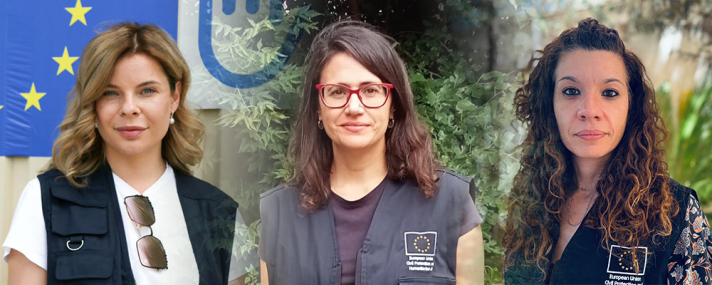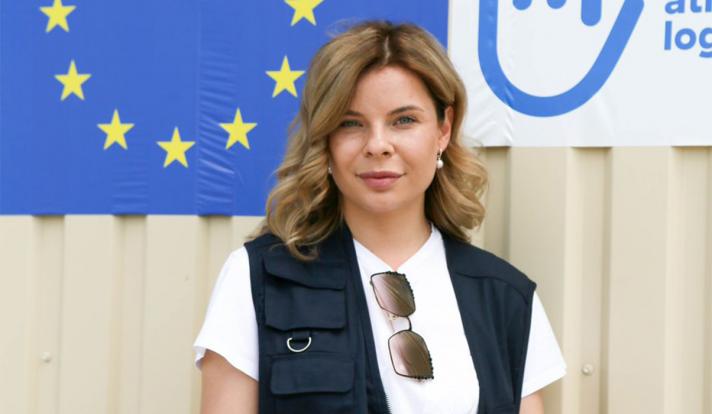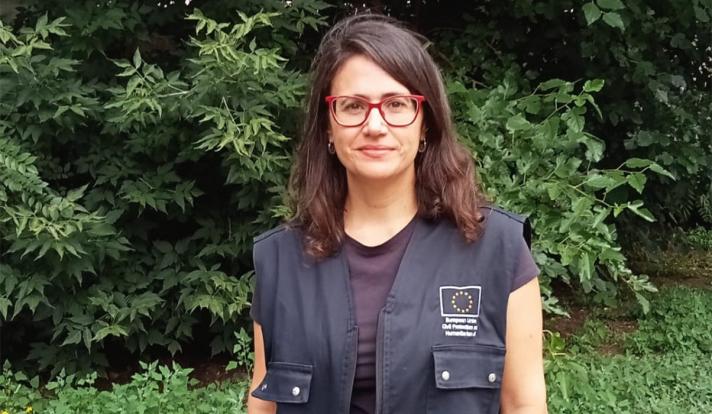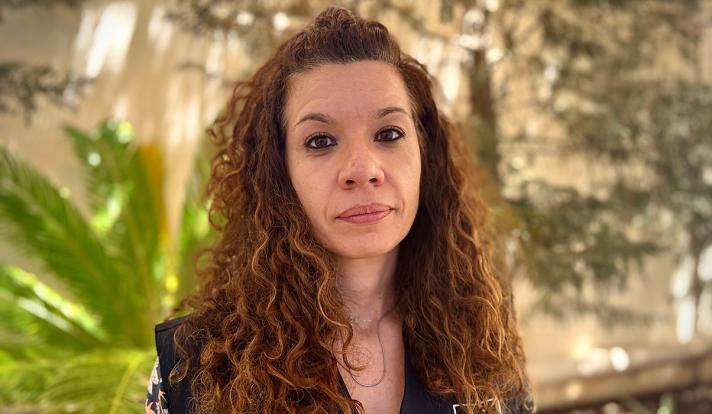It takes a village to deliver life-saving aid to people caught up in disasters and conflicts.
On this World Humanitarian Day, we want to introduce 3 of our “villagers”: With over 30 years of experience in humanitarian aid between them, Eliana, Olga and Laura are supporting the EU’s emergency response in Ukraine.
They have told us about the impact of the war on peoples’ lives, the challenges humanitarian workers face, and what keeps them going.
1. More than 17.7 million people in Ukraine need humanitarian aid. What are the biggest needs you see on the ground?
Olga: Since the Russian invasion, almost 1 in 3 Ukrainians has been forced to flee their homes. I meet families who had a good life before –homes, jobs, plans and hopes for the future - and whose belongings have been reduced to a plastic bag. Others left with 10 litres of petrol in their car, and when it ran out, they had to stop and find a place to stay. Sometimes we also observe that people must return to the occupied territories or locations with active hostilities, as they exhaust all resources and have no other choice.
Laura: Right now, I am in Dnipro in eastern Ukraine. People here really need accommodation. Collective centres have been set up in schools and universities, but only as temporary solutions. Another key issue is health care, including mental health, to help them cope with the trauma they experience. Especially the kids.
Eliana: We know very well that conflict and displacement put civilians at increased risk of gender-based violence, including rape and other forms of sexual violence, and that services must be established from the onset. Ukraine is no exception.
2. Can you tell me about the impact of humanitarian aid in Ukraine?
Laura: I have spoken to many doctors, especially traumatologists, who can treat the patients, in many cases, literally save their lives, thanks to the medical supplies and equipment they received. EU humanitarian aid also includes cash assistance that helps civilians cover their basic needs. People tell me that this cash has a direct and real impact on their lives. It allows them to pay for what they need most urgently, like medicine, food, or rent.
Eliana: We work to ensure that women and girls in Ukraine have access to sexual and reproductive health services, including survivors of sexual and gender-based violence. Many health facilities have become inaccessible or too damaged to function. We finance mobile clinics in the war-affected regions to reach as many women as possible.
Olga: We have also started preparing for the winter because we know it will be harsh. A quarter of our funding goes into this preparation. Through this, we will ensure that 1.3 million people in Ukraine will have a roof over their heads during the cold season.
“Working in humanitarian assistance is my life calling”, says Olga. Born and raised in Ukraine, she studied international relations in Cyprus and has been working in humanitarian aid since 2013. At the start of the Russian invasion, she supported refugees at the Ukrainian-Polish border, and retuned to Kyiv in June to join EU humanitarian aid.
3. Your job is to make sure that the most vulnerable receive the support they need. Can you explain what this looks like in practice?
Olga: We are one of the few donors with a permanent presence in the country, with offices in Kyiv, Dnipro and Lviv. We work with NGOs, UN agencies, and the Red Cross family, and my role is to support them. I visit EU-funded humanitarian aid projects and talk to beneficiaries and partner organisations to make sure aid is delivered in line with our principles, and that the funds are used properly.
Laura: I normally work in Sudan, but after the Russian invasion, I came to Ukraine to support the team. Now, I am based in Dnipro, where I provide technical support to our partners. EU humanitarian aid and partner organisations have been active in eastern Ukraine since the conflict started in 2014. The knowledge of the area and community is helping us better coordinate and deliver emergency aid now.
Eliana: My job as humanitarian protection and gender expert is to look at the needs and risks faced by different groups and then work with our humanitarian partners to make sure they are effectively addressed. In humanitarian crises, people need food, water, shelter, and medical assistance. But it doesn’t stop there. We aim to ensure that the projects we fund look beyond material needs to the broader issues of personal safety and dignity. Moreover, there is no ‘one size fits all’ in humanitarian assistance. You will be affected differently by a crisis if you are a woman, man, girl or boy, and you will face different protection risks.
Laura is from Tenerife, the largest and most populous of the Canary Islands. After studying law and international cooperation, she started working with international NGOs 14 years ago. In 2020, she joined the EU humanitarian aid team in Sudan, and is currently supporting the emergency response in Ukraine.
4. When in the field, you speak to humanitarian workers and people whose lives have been turned upside down by the war. What are some of your takeaways?
Eliana: I recently met with a Ukrainian family who had been waiting to cross into government-controlled areas in a queue inside their car for 6 days. Their suffering was evident, but their courage and resilience impressed me. When I think about how I would react in such a situation, I have troubles imagining I would be as strong.
Olga: The most terrifying thing for me is that the active fighting continues. Critical infrastructure is being hit, which will make people suffer even more in the winter. It feels like for every additional day of war, it will take us another year to recover. But, on a positive note, the international community is really stepping up; we see a lot of humanitarian funding flowing into Ukraine, with the EU as one of the biggest donors.
Laura: Many humanitarian workers, including some of our colleagues, were displaced in the war. This has not stopped them from continuing with their work, serving the most vulnerable individuals in the community. That’s something I find very impressive.
Eliana has more than 15 years’ experience in the Middle East, east Africa and Ukraine, including eight years as EU expert for humanitarian protection and gender in emergencies: “I started my work in Somalia after I finished my master’s degree in international Cooperation. I left Italy, my home country, for a 3-month experience, and never came back.”
5. Working in the humanitarian field comes with a lot of challenges. You are often separated from friends and family and work in dangerous places. What is your motivation for doing this job?
Olga: I find it incredible that in the 21st century, we are still facing all this suffering. I think every person deserves a chance to have a good life, and when people go through crises, they have the right to receive assistance. It can literally happen to anyone – look at Ukraine. No one deserves to go through this. I am ready to give my all to help.
Eliana: Working in conflict-affected zones was not really a choice, but I found myself humbled by the resilience of the affected communities I met during my work. I felt that I could play a role in having their voices heard and their rights respected. This is what keeps me going.
Laura: Maybe this will sound a bit romantic, but I believe that we, as humans, are a community. I believe that we need to support each other, and this support is essential for each and every person facing a crisis to fulfil their human rights.
Interview by Lisa Hastert, Regional Information Officer for the European Neighbourhood, EU Civil Protection and Humanitarian Aid Operations.
Publication date: 19/08/2022




